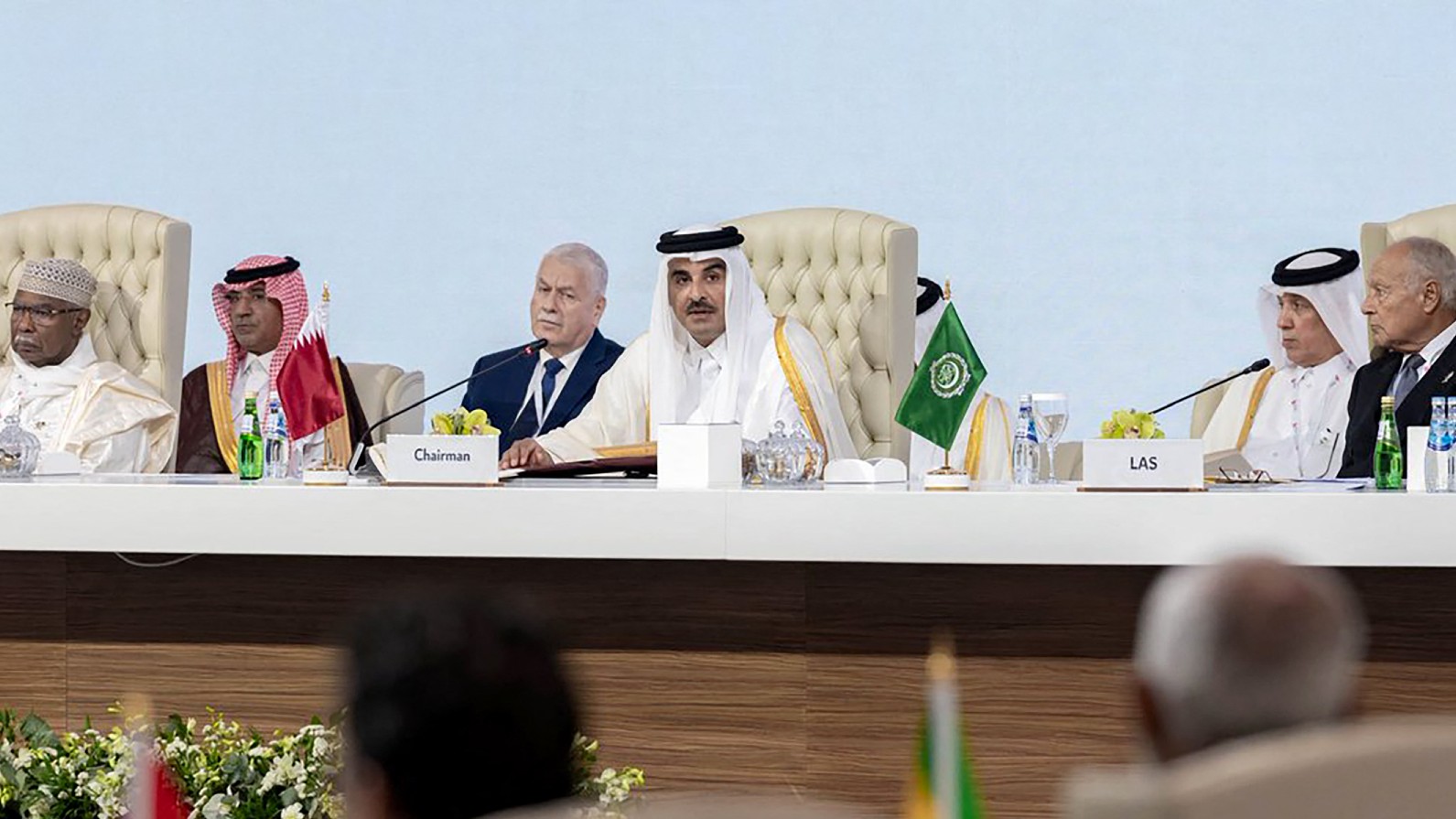A Gulf official has denied an exclusive Middle East Eye report that said an Egyptian plan to form a Nato-style Arab defence force was rejected at this week’s Doha summit.
The Gulf official contacted MEE on Sunday and said that “false claims” were being “circulated to cast the GCC [a body representing the six Gulf countries] in a negative light” and that they were “detrimental to ongoing regional security discussions”.
The official’s comments came less than a day after a senior Egyptian diplomat told MEE that at Monday’s summit Egypt had proposed the establishment of a defensive regional force that would “shield member states from external threats, particularly Israel”.
However, the diplomat said that several factors led to the proposal being rejected, including disagreements over who would lead the force.
Egypt had reportedly argued that it should lead the mechanism, while Saudi Arabia advocated that it should take command.
New MEE newsletter: Jerusalem Dispatch
Sign up to get the latest insights and analysis on
Israel-Palestine, alongside Turkey Unpacked and other MEE newsletters
Days later, Saudi Arabia signed a mutual defence pact with nuclear-armed Pakistan.
Meanwhile, at Monday’s meeting, the GCC made no promises of concrete action against Israel and said it would instead call a meeting of the Joint Defence Council and Higher Military Committee.
According to the Egyptian diplomat, Cairo had hoped for the summit attendees to take concrete steps against Israel, or at least demand an end to Israel’s genocide in Gaza and reject any forced displacement of Palestinians into North Sinai.
The diplomat blamed US influence for the lacklustre response and said Washington wanted to limit the Arab response to mere statements in support of Gaza and condemnation of Israel.
‘Media reports claiming that Qatar and the UAE blocked a regional defensive force to counter Israeli aggression and opted for a GCC one are entirely false’
– Gulf official
Another diplomat said that other Arab states “found themselves cornered when Qatar’s stance, backed by the UAE, dominated the meeting”.
“They decided that any step against Israel would now be futile, and that the best option was to push the US to pressure Israel into a ceasefire in Gaza,” the diplomat said, adding that “most of these talks took place between the foreign ministers of Gulf states and their Egyptian counterpart, [Foreign Minister Badr] Abdelatty, behind closed doors on the sidelines of the summit, and were not made public.”
The Gulf official told MEE that “media reports claiming that Qatar and the UAE blocked a regional defensive force to counter Israeli aggression and opted for a GCC one are entirely false. No such proposal was put forward during the Arab-Islamic emergency summit in Doha.”
“There was a unanimous consensus among all participants, which was reflected in the statement released at the end of the summit,” the official added.
Qatar demands public apology
Within hours of Israel’s 9 September attack on Doha, Qatar’s prime minister appealed to the international community to bring Israeli Prime Minister Benjamin Netanyahu to “justice”.
In the attack, several Israeli missiles targeted a building in Doha’s West Bay Lagoon area as Hamas members gathered to discuss the latest US proposal for ending the nearly two-year conflict.
All of the senior leaders in the building survived, including Hamas leaders Khalil al-Hayya, Khaled Meshal, Zaher Jabarin, and others.
However, six people were killed, including Hayya’s son, Hammam; his office director, Jihad Lubbad; and Qatari Lance-Corporal Badr Saad Mohammed al-Humaidi al-Dosari.
On Saturday, Axios reported that Qatar was conditioning its continued role as a mediator in the ceasefire talks on a public Israeli apology for the strike.
The Gulf nation has been the main mediator – along with Egypt – in the long-running negotiations for an end to the war.
Earlier this month, Hamas accepted the latest ceasefire proposal, but Israel rejected it despite reportedly signing off on it in the first place.
More than 238,000 Palestinians have been killed, wounded or remain missing since Israel launched its war on Gaza in October 2023. Recent reports, based on Israeli military intelligence data, indicate that more than 80 percent of those killed in the enclave until May of this year were civilians.

